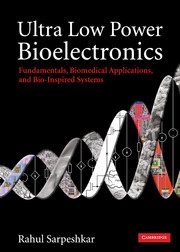Book contents
- Frontmatter
- Contents
- Acknowledgements
- Section I Foundations
- Section II Low-power analog and biomedical circuits
- Section III Low-power RF and energy-harvesting circuits for biomedical systems
- Section IV Biomedical electronic systems
- Section V Principles for ultra-low-power analog and digital design
- Section VI Bio-inspired systems
- Section VII Energy sources
- Bibliography
- Index
- Epilogue
Epilogue
Published online by Cambridge University Press: 02 December 2010
- Frontmatter
- Contents
- Acknowledgements
- Section I Foundations
- Section II Low-power analog and biomedical circuits
- Section III Low-power RF and energy-harvesting circuits for biomedical systems
- Section IV Biomedical electronic systems
- Section V Principles for ultra-low-power analog and digital design
- Section VI Bio-inspired systems
- Section VII Energy sources
- Bibliography
- Index
- Epilogue
Summary
Information is represented by the states of physical devices. It costs energy to transform or maintain the states of these physical devices. Thus, energy and information are deeply linked. It is this deep link that allows us to articulate information-based principles for ultra-low-power design that apply to biology or to electronics, to analog or to digital systems, to electrical or to non-electrical systems, at small scales or at large scales. The graphical languages of circuits and feedback serve as powerful unifying tools to understand or to design low-power systems that range from molecular networks in cells to biomedical implants in the brain to energy-efficient cars.
A vision that this book has attempted to paint in the context of the fields of ultra-low-power electronics and bioelectronics is shown in the figure below. Engineering can aid biology through analysis, instrumentation, design, and repair (medicine). Biology can aid engineering through bio-inspired design. The positive-feedback loop created by this two-way interaction can amplify and speed progress in both disciplines and shed insight into both. It is my hope that this book will bring appreciation to the beauty, art, and practicality of such synergy and that it will inspire the building of more connections in one or both directions in the future.
- Type
- Chapter
- Information
- Ultra Low Power BioelectronicsFundamentals, Biomedical Applications, and Bio-Inspired Systems, pp. 890Publisher: Cambridge University PressPrint publication year: 2010



